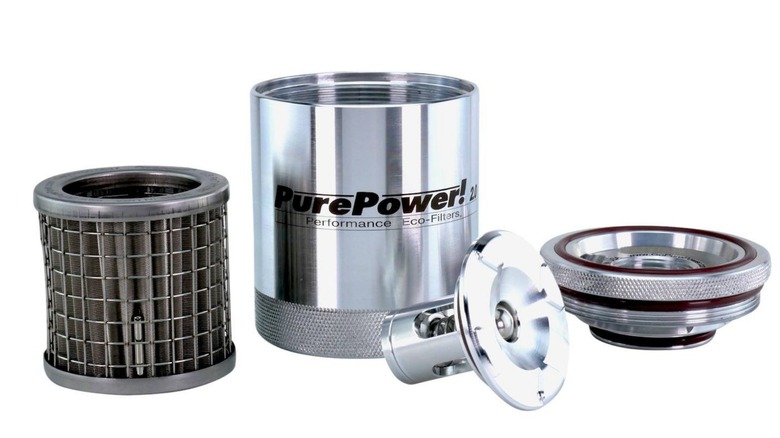Can You Clean And Reuse An Oil Filter?
When it comes to auto care, your car requires a lot of routine maintenance to stay in prime condition. Those tasks include things like fluid top-offs and replacements, belt changes, as well as wheel alignment and tire rotation services. Of those routine maintenance jobs, engine oil replacements are among the most critical and frequent tasks you must perform. Depending on your car type, you should change your engine oil every 3,000 to 7,500 miles. However, changing the oil doesn't just involve draining the old fluid out and replacing it with clean oil. You also need to replace your engine oil filter each time you change the oil.
The filter's job is to help keep the oil clean and prevent clogs and engine damage by filtering debris and pollutants out of the oil before it travels to the engine. Standard oil filters usually use a synthetic fiber or paper filter material. These devices are single-use items, meaning you cannot clean and reuse them, and you should never perform an oil change without replacing the filter.
But what about reusable oil filters? Well, there are a handful of manufacturers that make reusable engine oil filters. These devices are designed to be cleaned and reused multiple times, and, instead of paper or fiber filters, they rely on metal mesh and magnets to prevent debris from reaching the engine. However, reusable oil filters also come with a couple of downsides, and they may not be as practical as you think. Here's what you need to know about reusable engine oil filters and why you may not want to use one in your car.
What are the differences between disposable and reusable oil filters?
As mentioned, standard disposable oil filters contain an internal filter material, usually constructed from pleated paper or synthetic fiber. This material catches metal shavings and other debris, preventing pollutants from reaching the engine's internal components and causing damage.
In comparison, reusable filters rely on metal mesh filtration systems and magnets to catch and trap debris and pollutants. They may be made from materials like surgical steel or aircraft-grade aluminum, and some reusable oil filter makers claim that their products provide more efficient flow rates while also trapping substantially greater levels of debris. Reusable oil filters are fairly complex devices, utilizing things like pressure differential valves to control flow and various levels of filtration to maximize oil cleanliness. According to some reusable oil filter manufacturers, these products can trap particles as small as 5 microns, maximizing engine protection and even helping cut down on toxic emissions.
As the name implies, reusable oil filters are designed to be cleaned and reused repeatedly. Some of these devices have set lifetimes, while others are designed to last for as long as you own your vehicle. However, you do have to clean them regularly, just like you have to replace a standard filter. Cleaning a reusable oil filter can be tedious, and if you don't do it correctly, you may damage the filter or your vehicle. Alternatively, you can send some reusable oil filters to the manufacturer for a cleaning service, but that may not be the most practical choice for your wallet or vehicle.
Why you should probably avoid reusable oil filters
Now that you know a little more about reusable oil filters, you may wonder why you should stick with standard disposable models. For one, reusable oil filters are pretty pricey and can cost upwards of $300. While you may spend more than that on replacement oil filters during the lifetime of your car, it will be spread out over the years and is not an expense you have to pay all at once. Several hundred dollars is a lot of money to dump on a reusable oil filter, especially compared to the price of a standard disposable filter, which frequently costs less than $20.
You also need to consider the cleaning process. As mentioned above, cleaning a reusable oil filter can be tedious and challenging, and if you don't clean the device properly, you may cause damage to the filter or your vehicle. Alternatively, you can pay to send some reusable oil filters back to the manufacturer for cleaning. However, doing so will mean you can't drive your car while you're waiting to get the filter back, and the service most likely won't be free.
Finally, while reusable oil filters are often advertised as being superior to disposable filters, there's no guarantee that they can provide the same level of protection as the disposable filters your car's manufacturer recommends using. It's always best to stick with original equipment manufacturer (OEM) parts and follow the manufacturer's suggestions, and doing so is the best way to avoid vehicle malfunctions and issues with your warranty.


